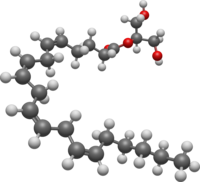
Photo from wikipedia
G-protein–coupled receptor (GPCR) heterodimerization has emerged as a means by which alternative signaling entities can be created; yet, how receptor heterodimers affect receptor pharmacology remains unknown. Previous observations suggested a… Click to show full abstract
G-protein–coupled receptor (GPCR) heterodimerization has emerged as a means by which alternative signaling entities can be created; yet, how receptor heterodimers affect receptor pharmacology remains unknown. Previous observations suggested a biochemical antagonism between GPCRs, CXCR4 and CB2 (CNR2), where agonist-bound CXCR4 and agonist-bound CB2 formed a physiologically nonfunctional heterodimer on the membrane of cancer cells, inhibiting their metastatic potential in vitro. However, the reduced signaling entities responsible for the observed functional outputs remain elusive. This study now delineates the signaling mechanism whereby heterodimeric association between CXCR4 and CB2, induced by simultaneous agonist treatment, results in decreased CXCR4-mediated cell migration, invasion, and adhesion through inhibition of the Gα13/RhoA signaling axis. Activation of CXCR4 by its cognate ligand, CXCL12, stimulates Gα13 (GNA13), and subsequently, the small GTPase RhoA, which is required for directional cell migration and the metastatic potential of cancer cells. These studies in prostate cancer cells demonstrate decreased protein expression levels of Gα13 and RhoA upon simultaneous CXCR4/CB2 agonist stimulation. Furthermore, the agonist-induced heterodimer abrogated RhoA-mediated cytoskeletal rearrangement resulting in the attenuation of cell migration and invasion of an endothelial cell barrier. Finally, a reduction was observed in the expression of integrin α5 (ITGA5) upon heterodimerization, supported by decreased cell adhesion to extracellular matrices in vitro. Taken together, the data identify a novel pharmacologic mechanism for the modulation of tumor cell migration and invasion in the context of metastatic disease. Implications: This study investigates a signaling mechanism by which GPCR heterodimerization inhibits cancer cell migration. Mol Cancer Res; 16(4); 728–39. ©2018 AACR.
Journal Title: Molecular Cancer Research
Year Published: 2018
Link to full text (if available)
Share on Social Media: Sign Up to like & get
recommendations!